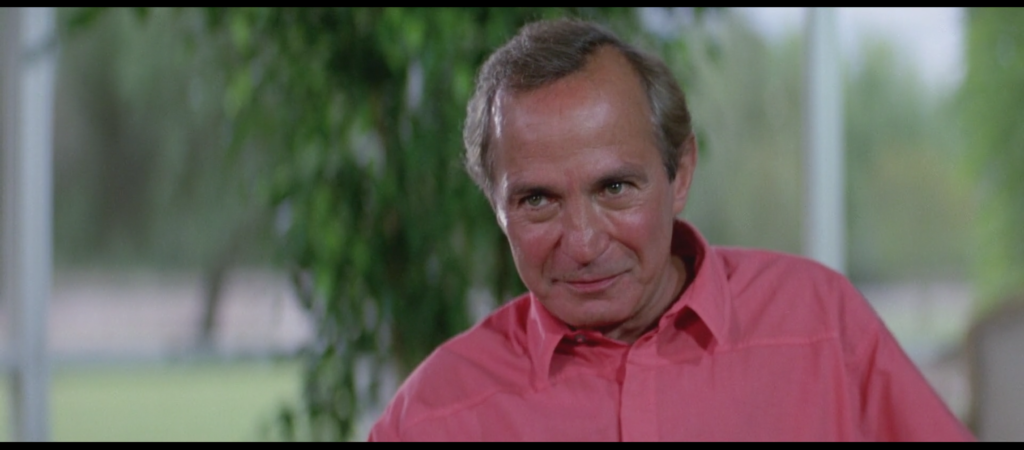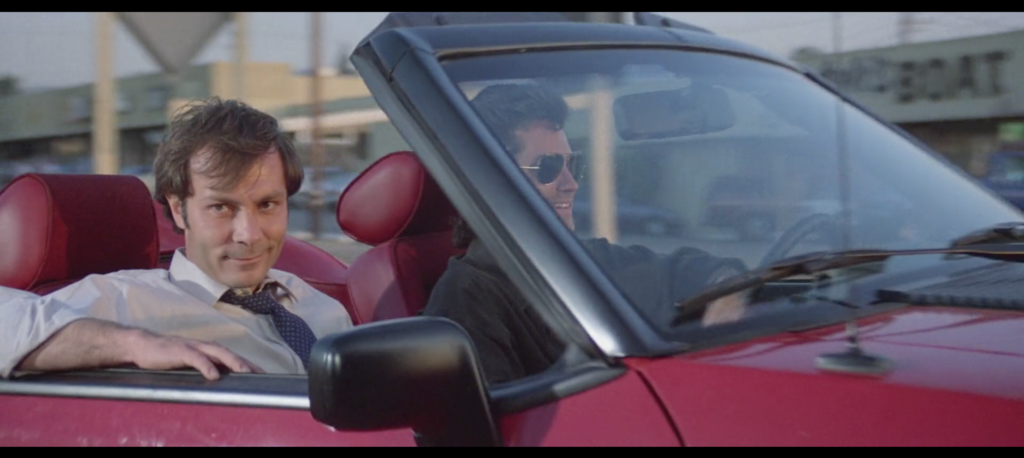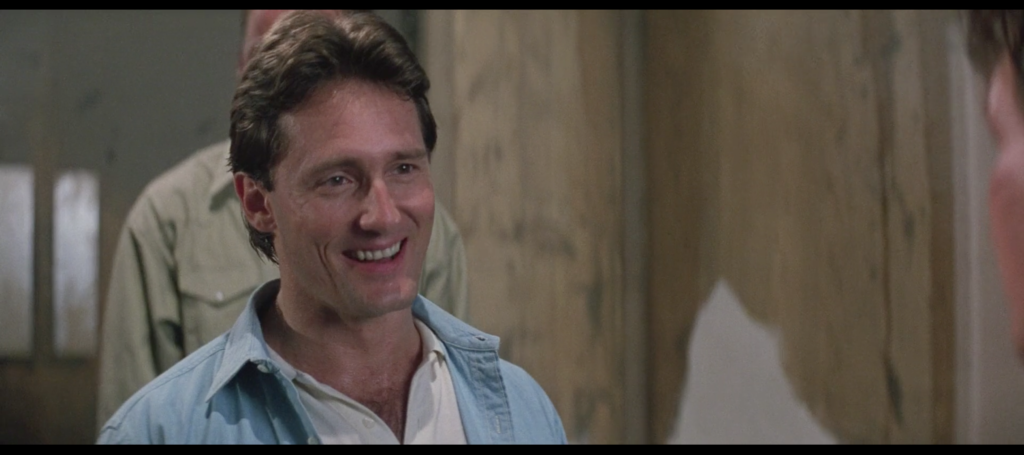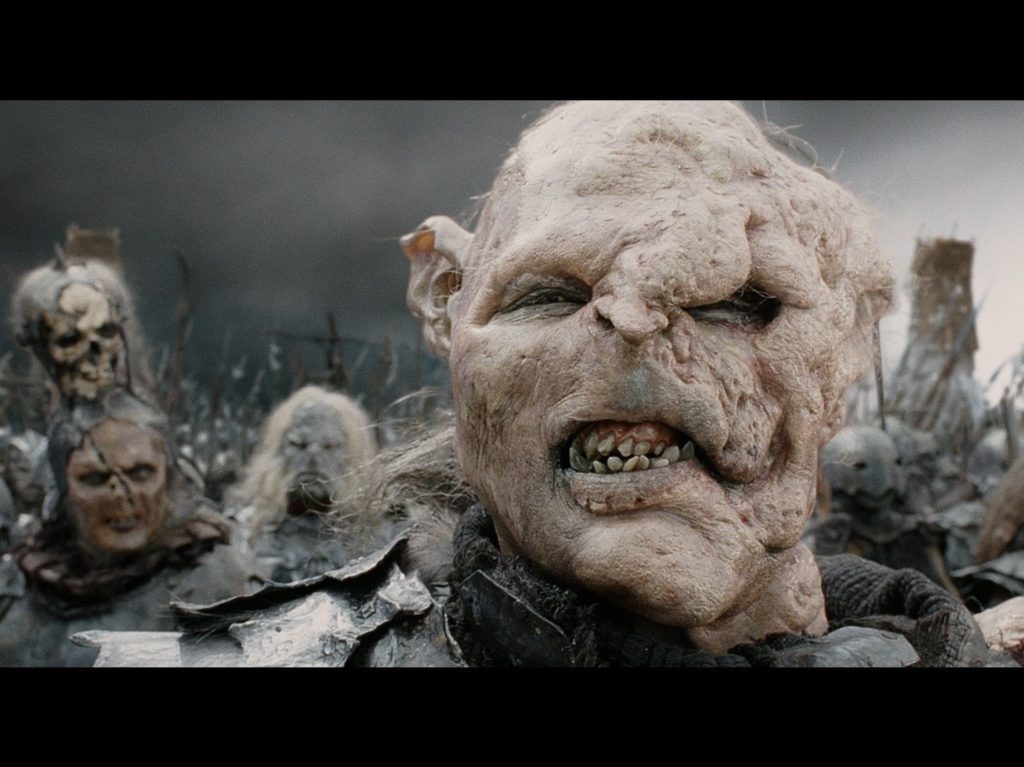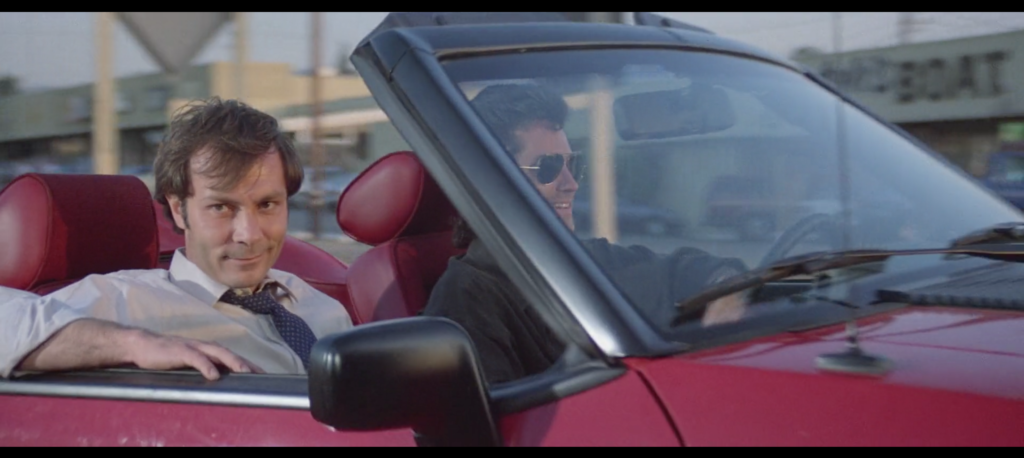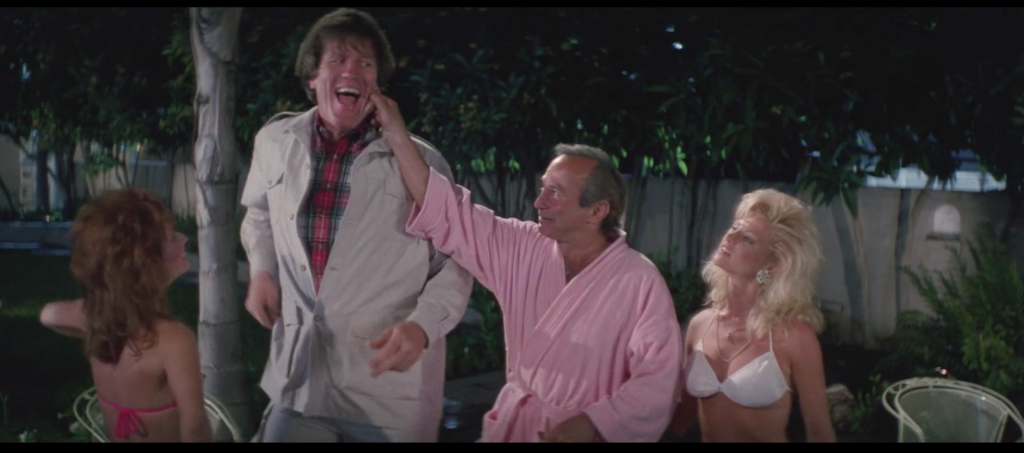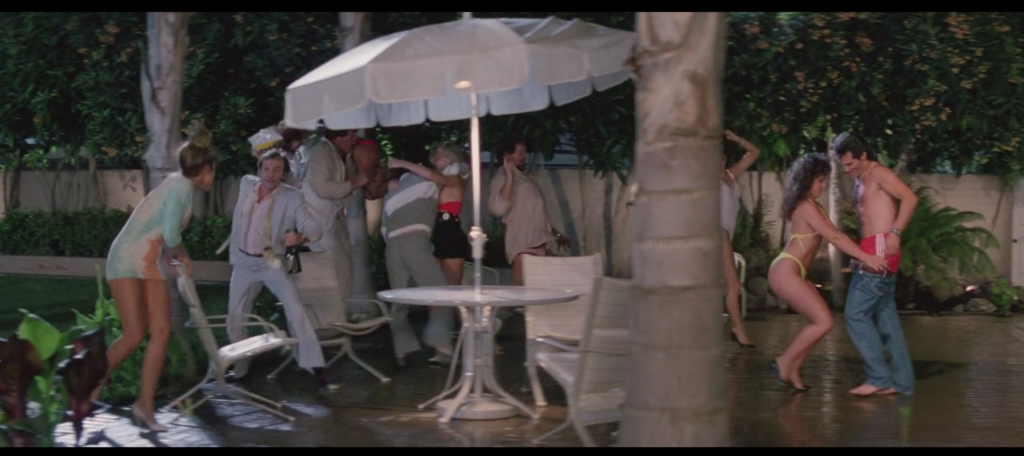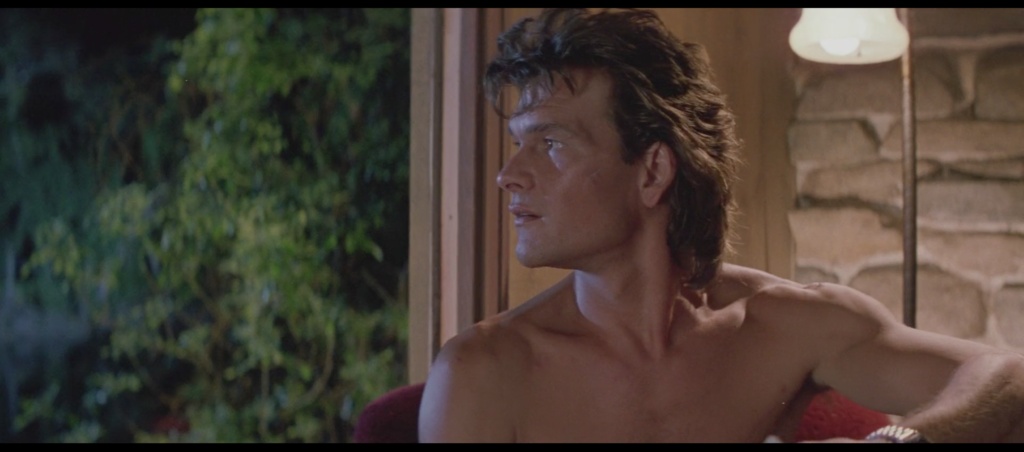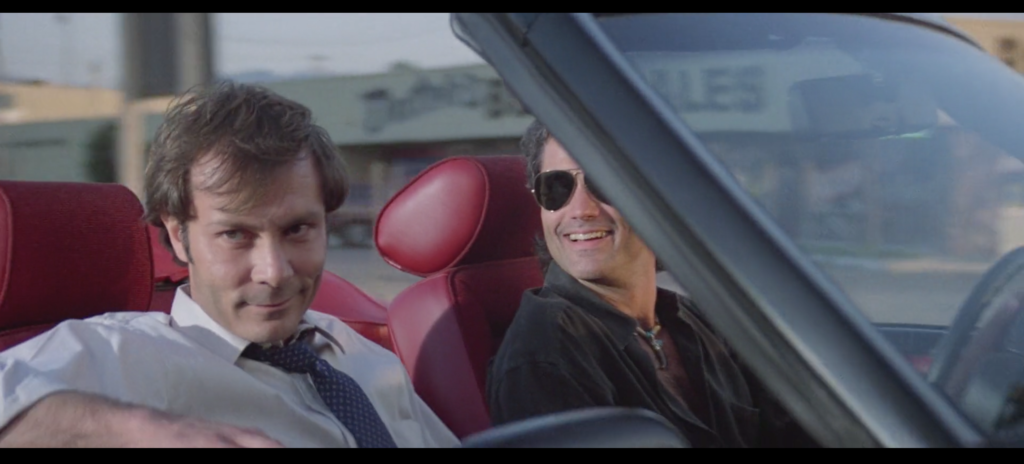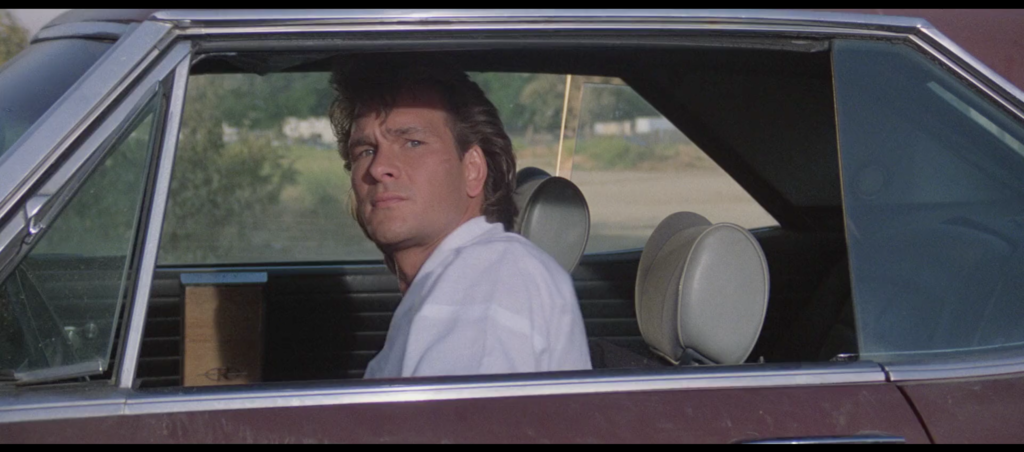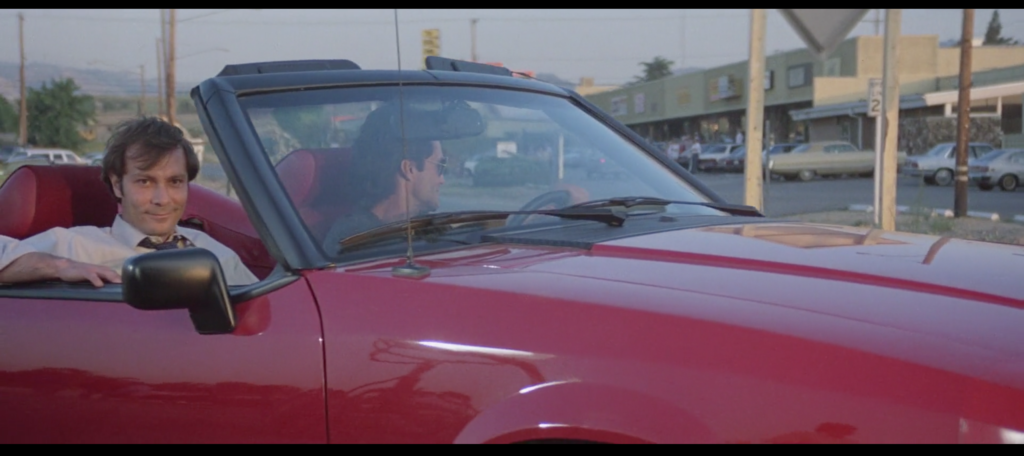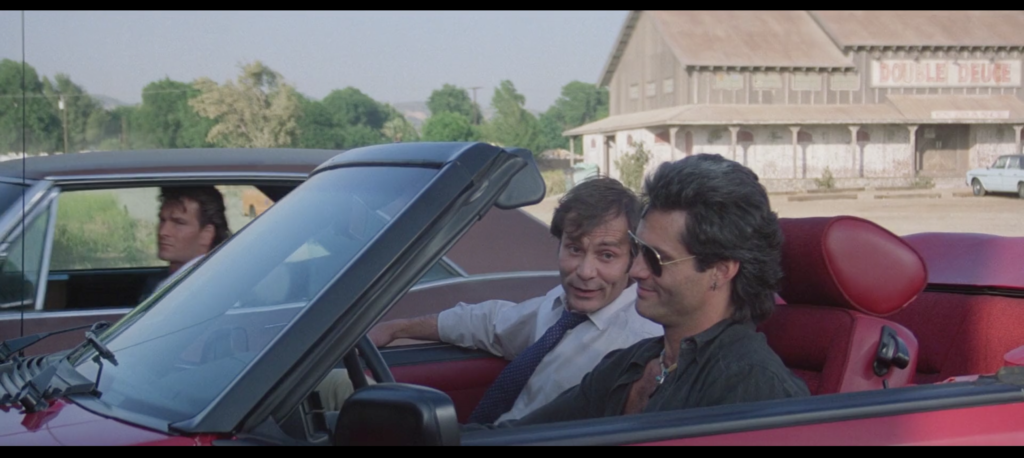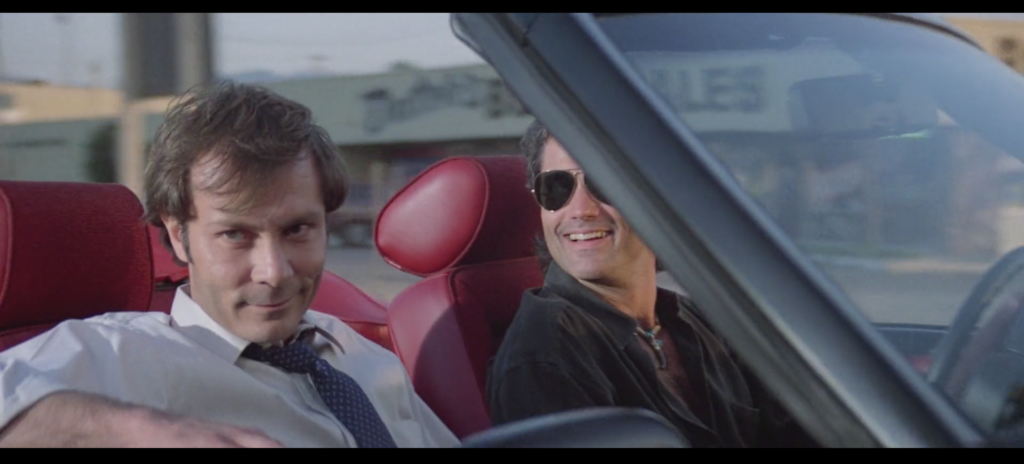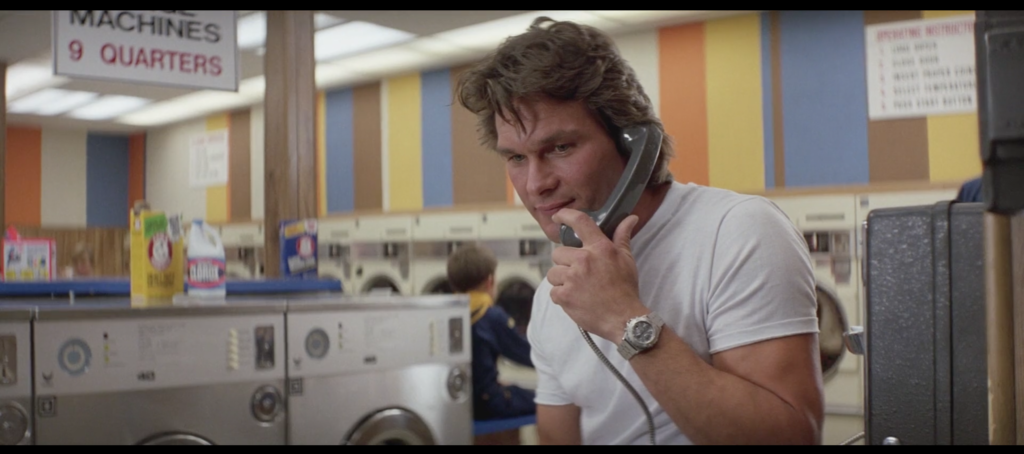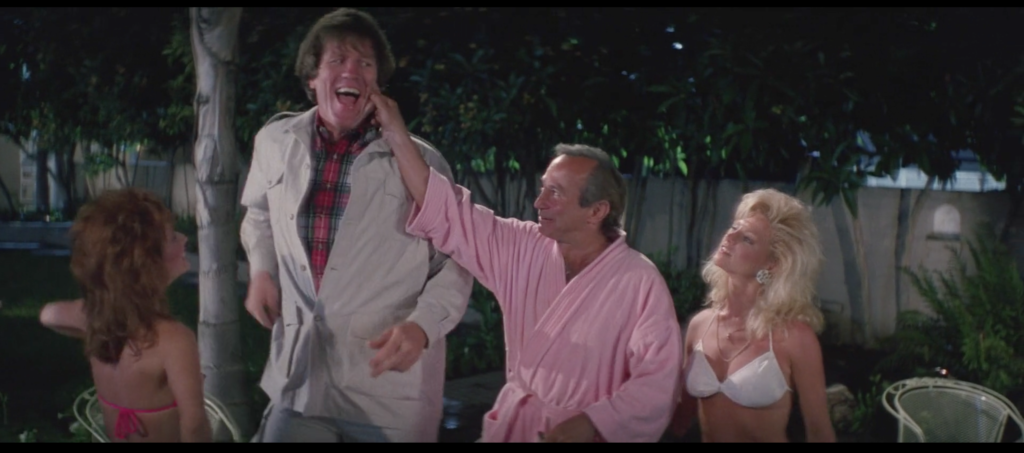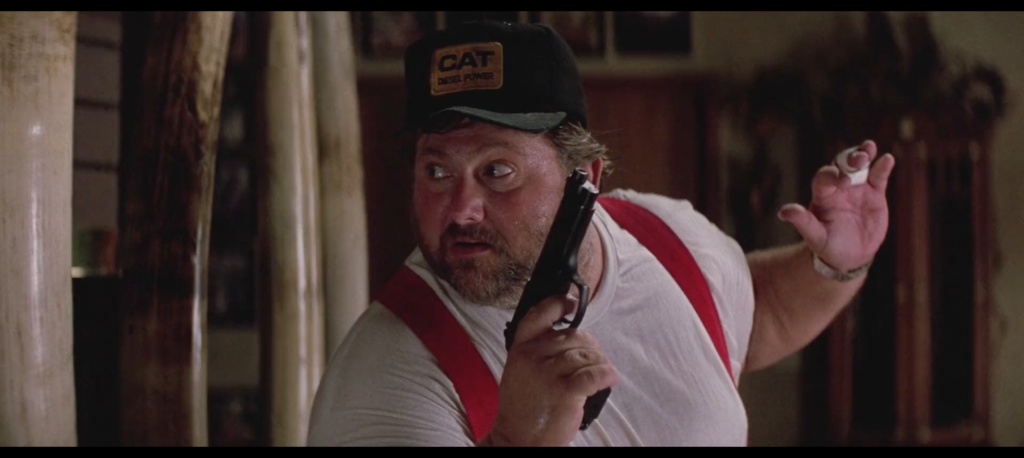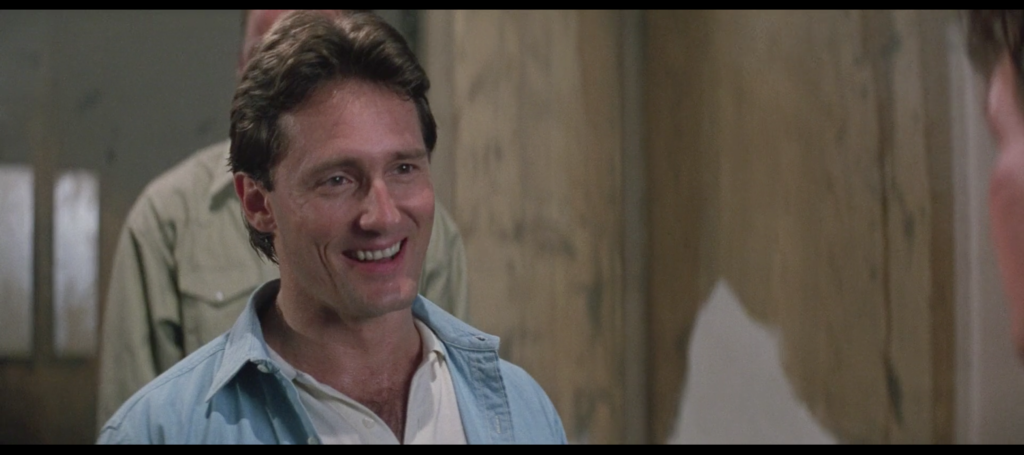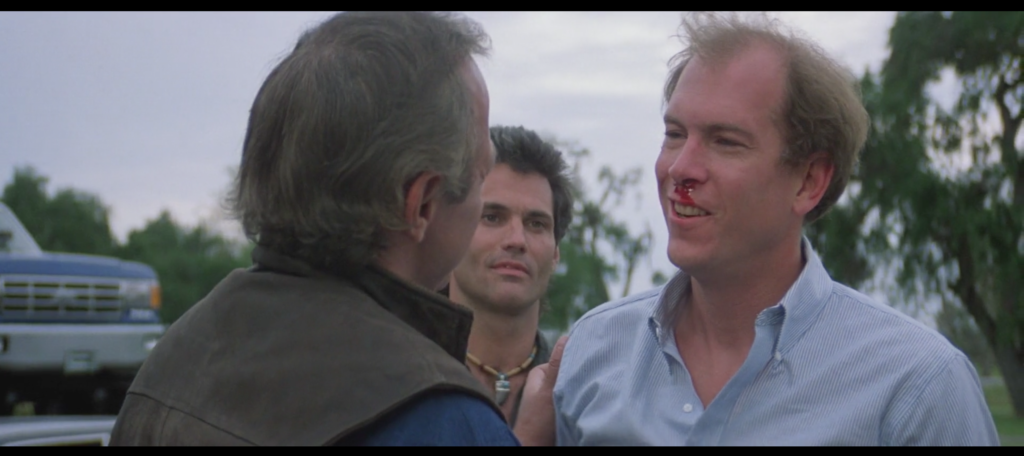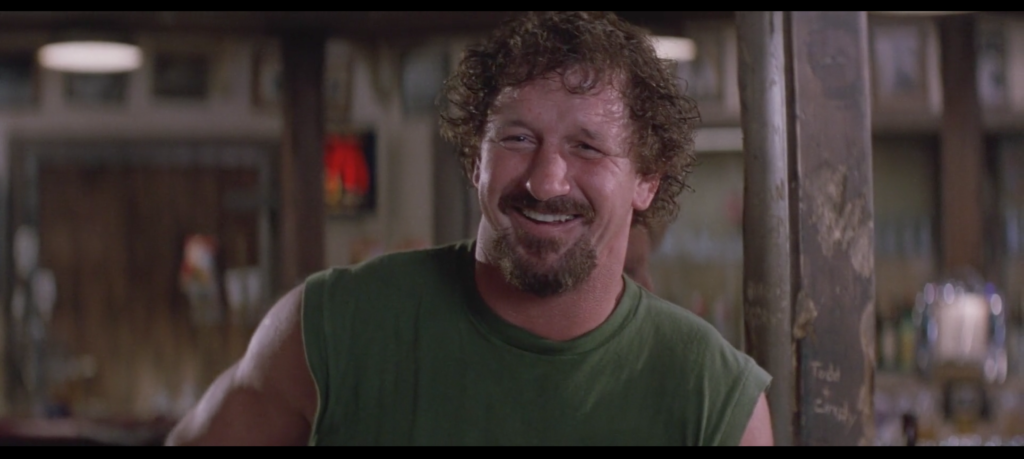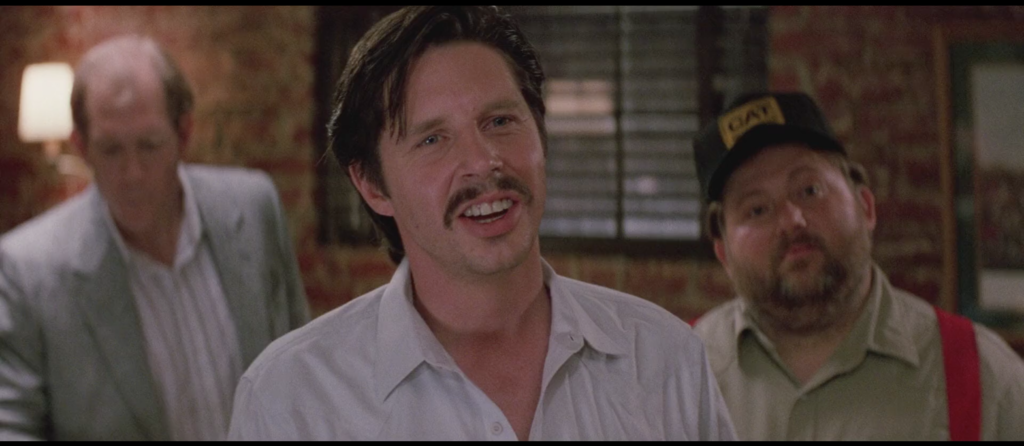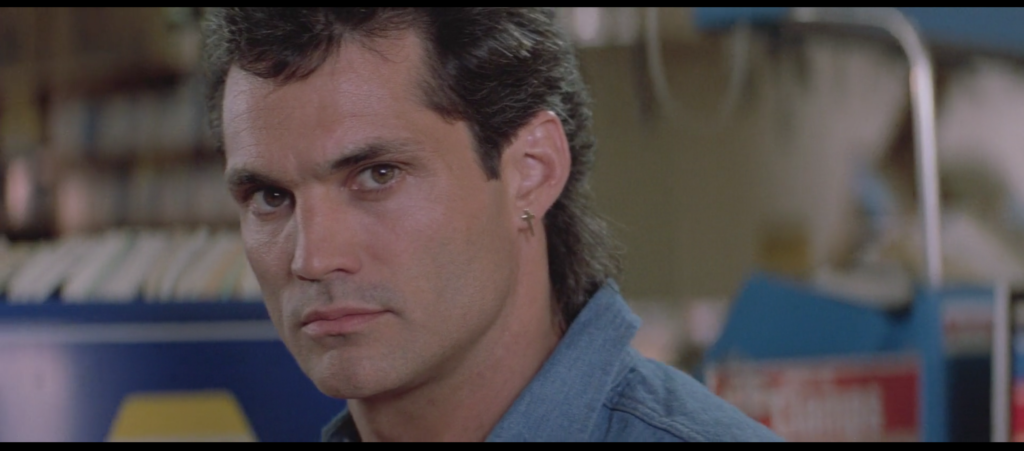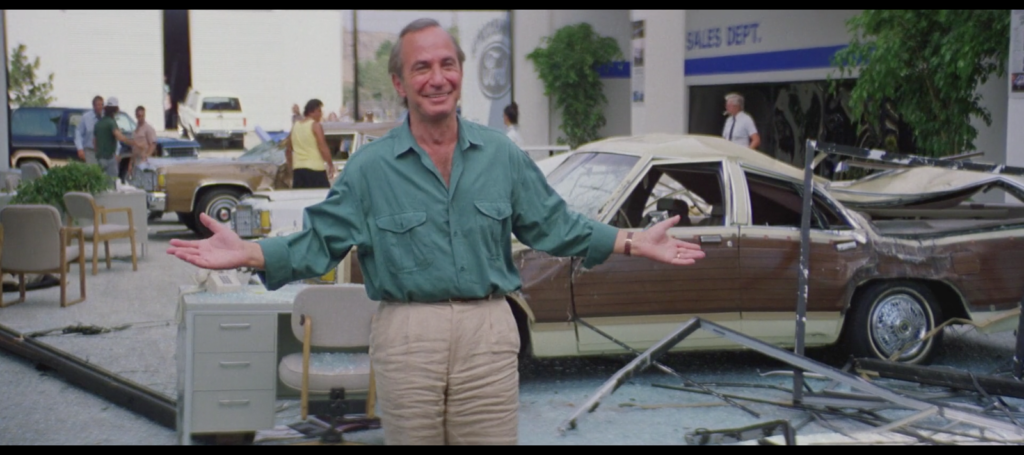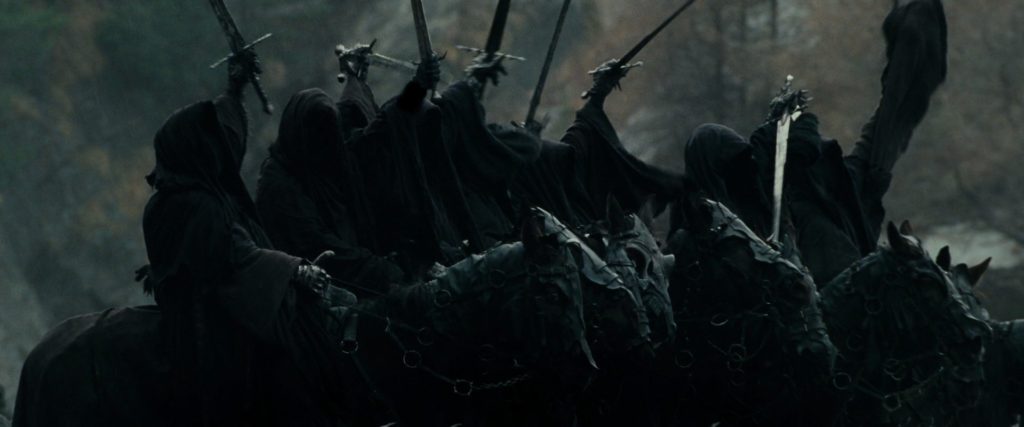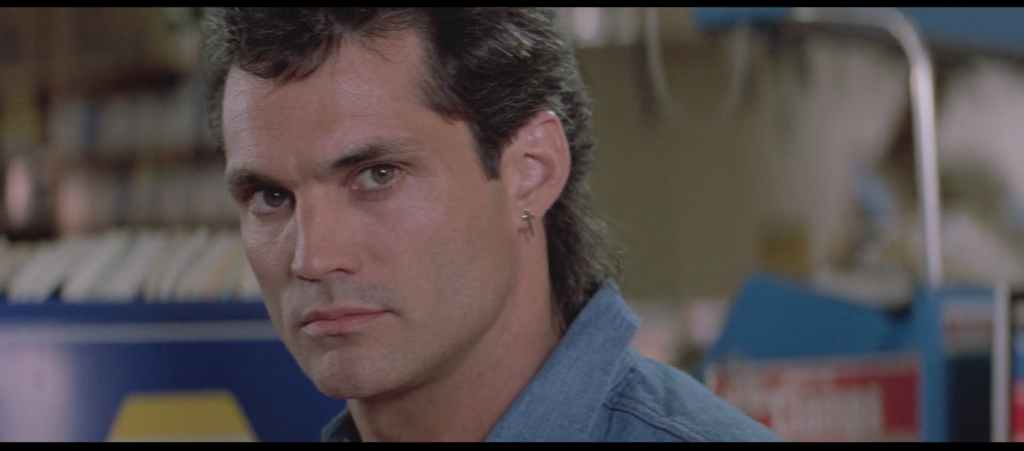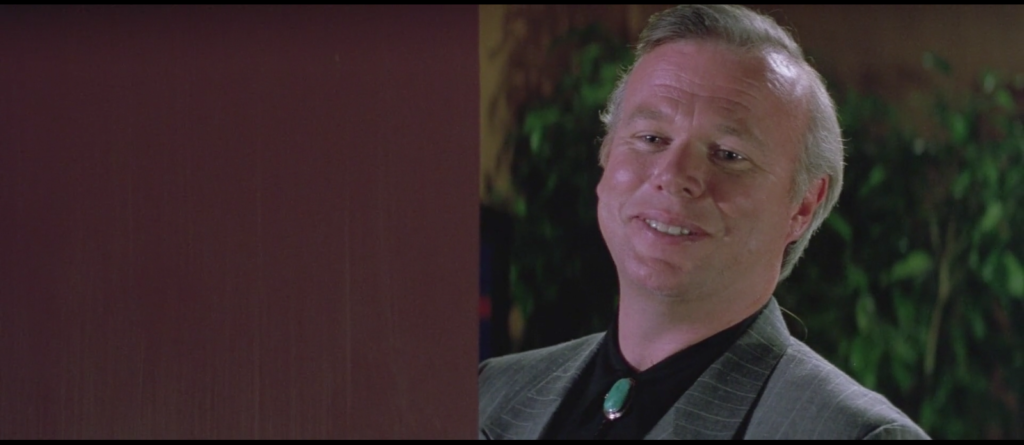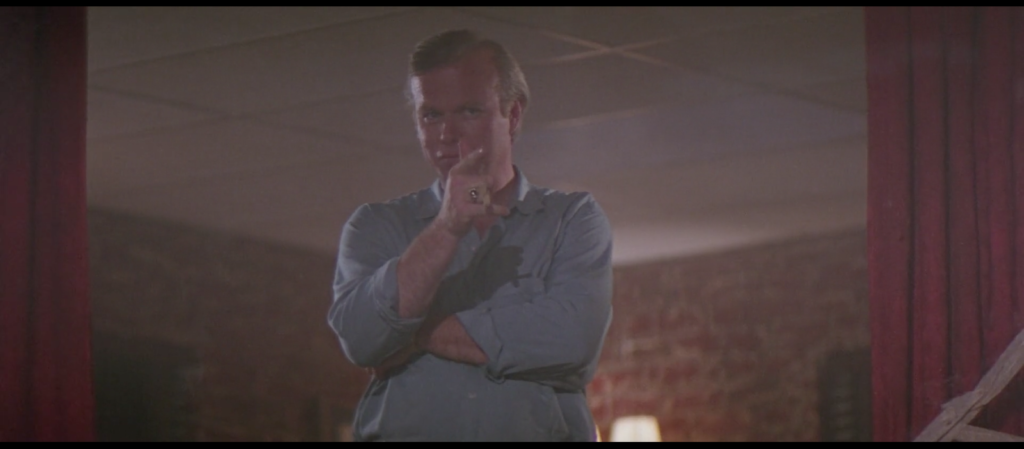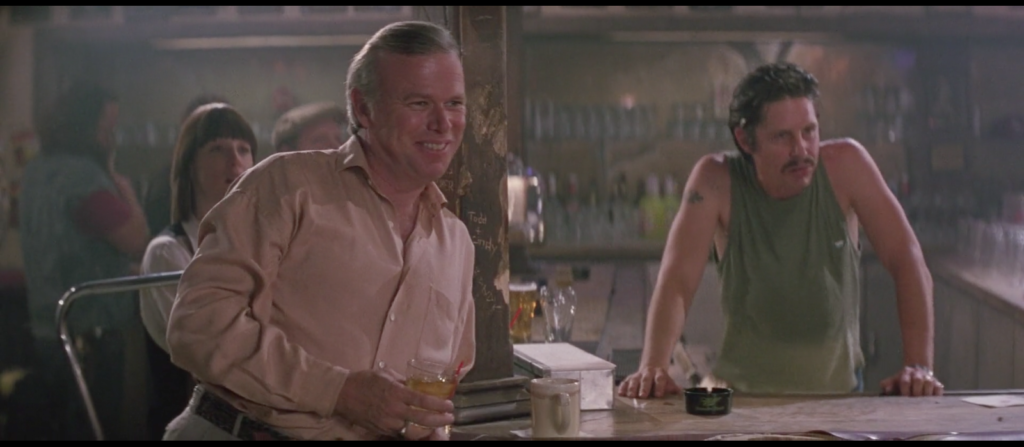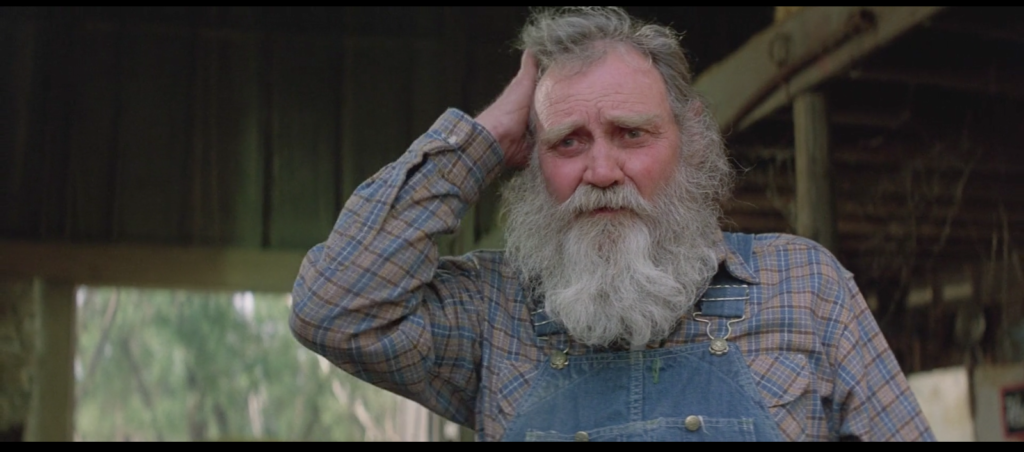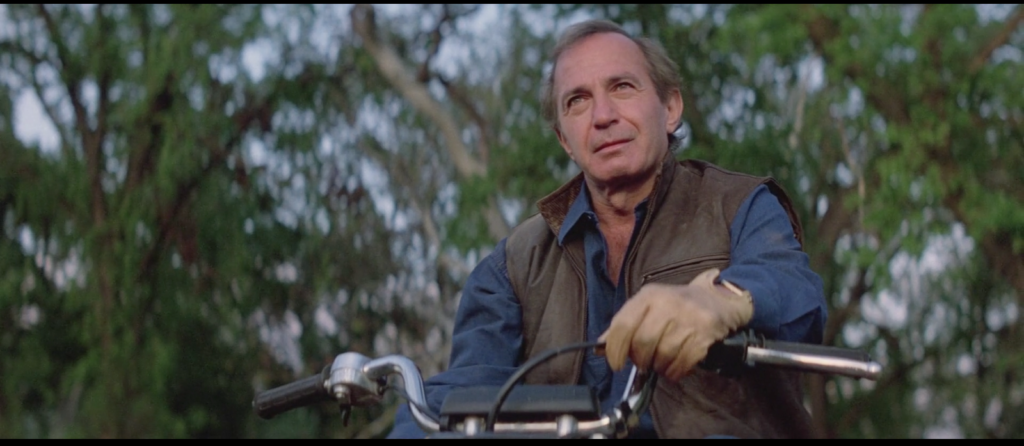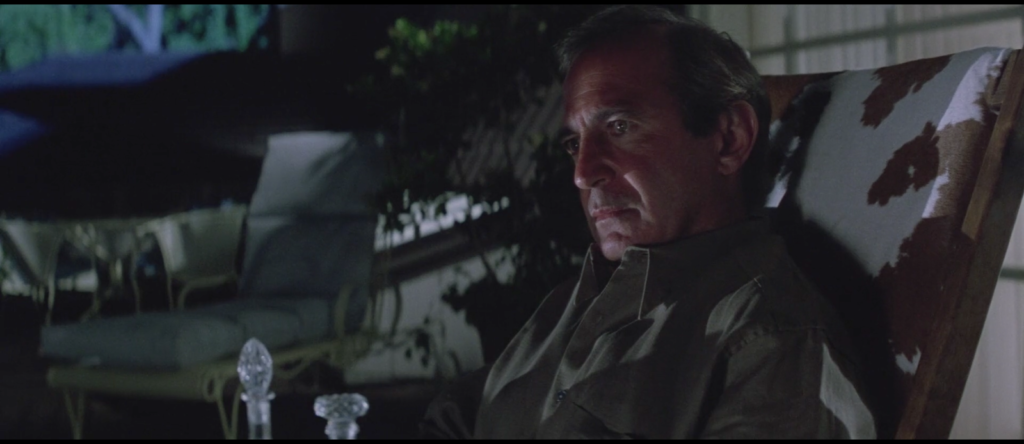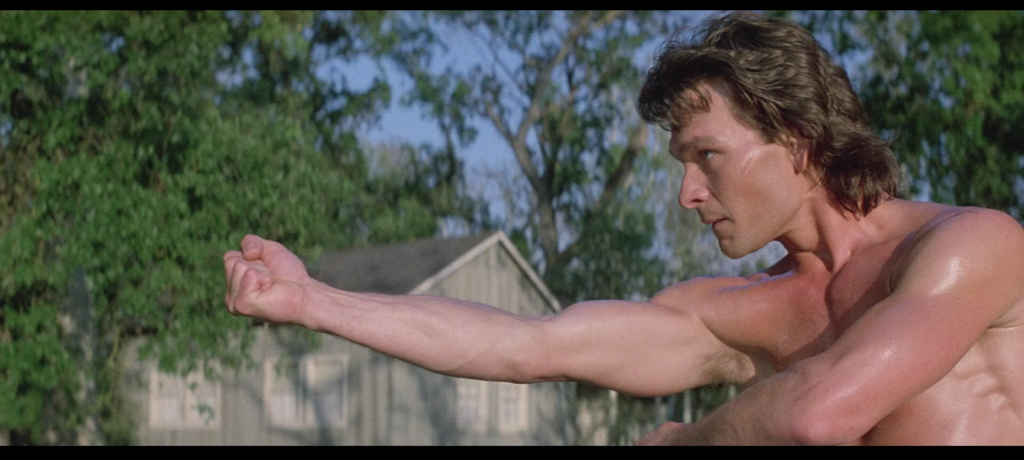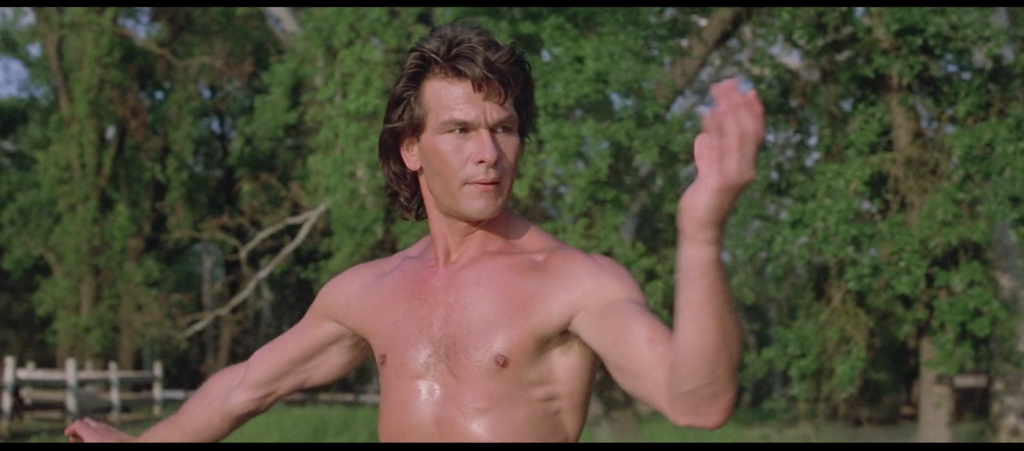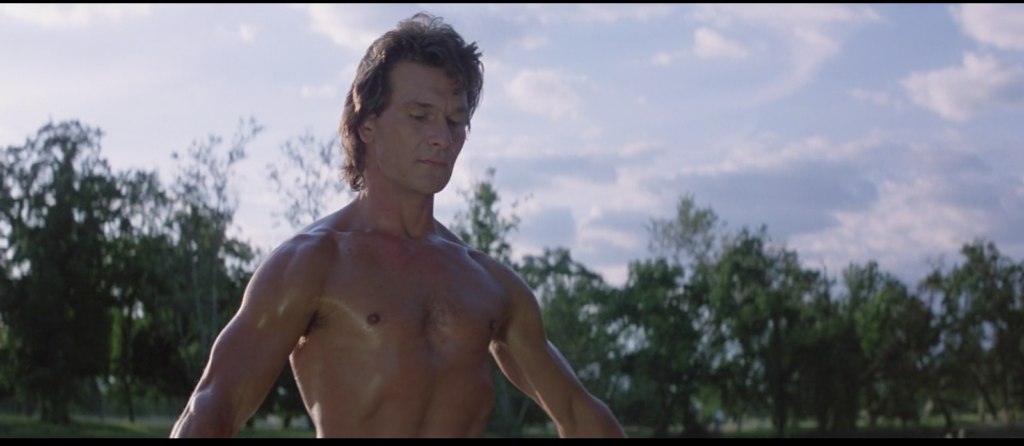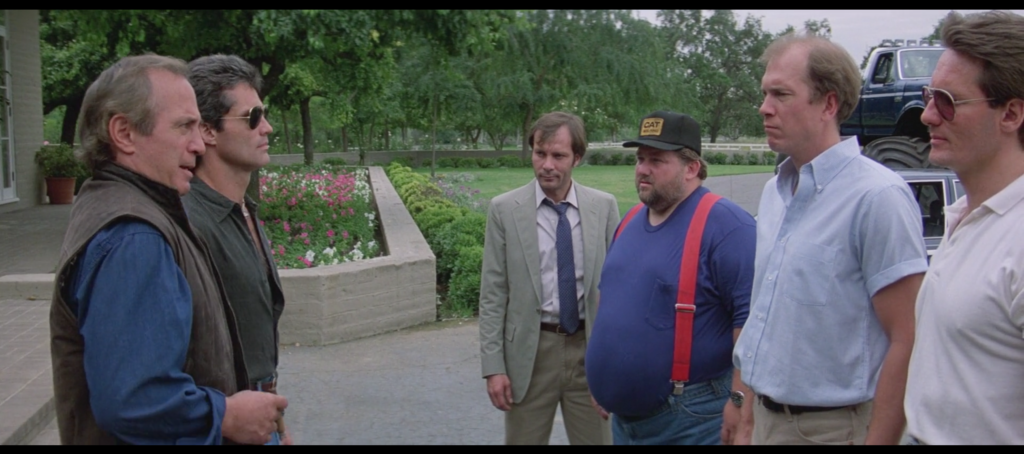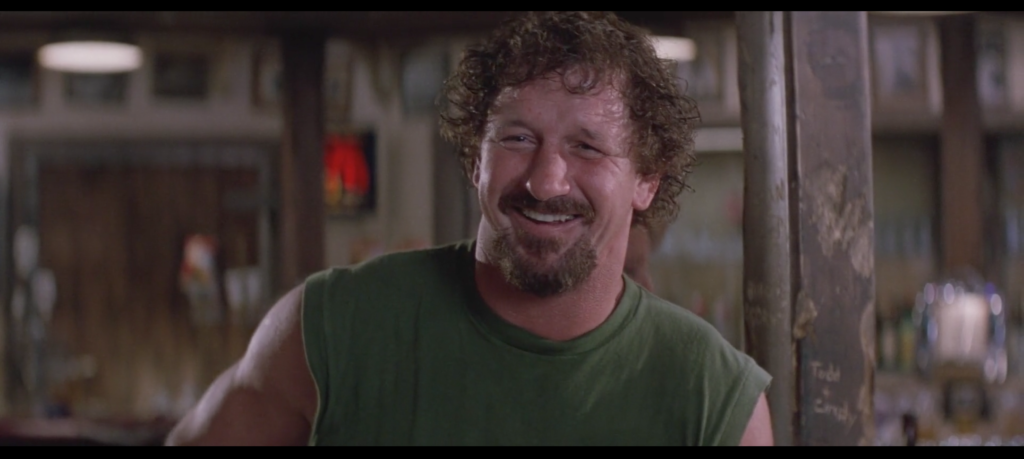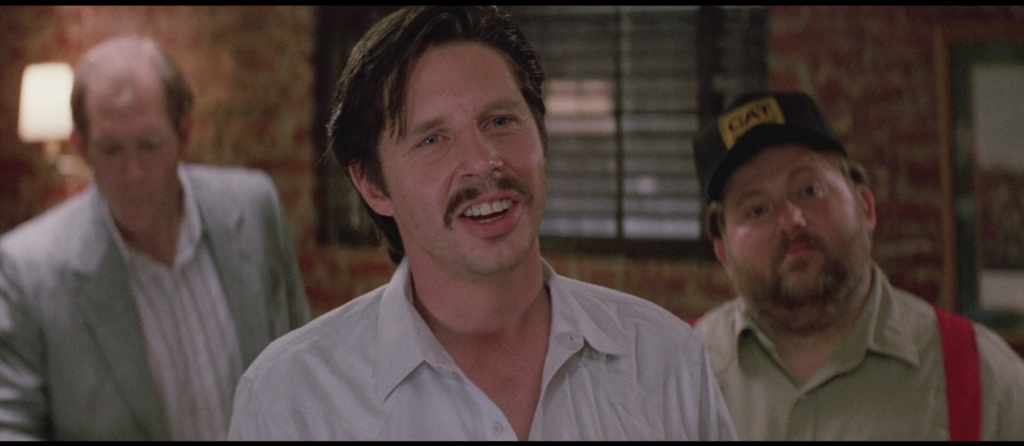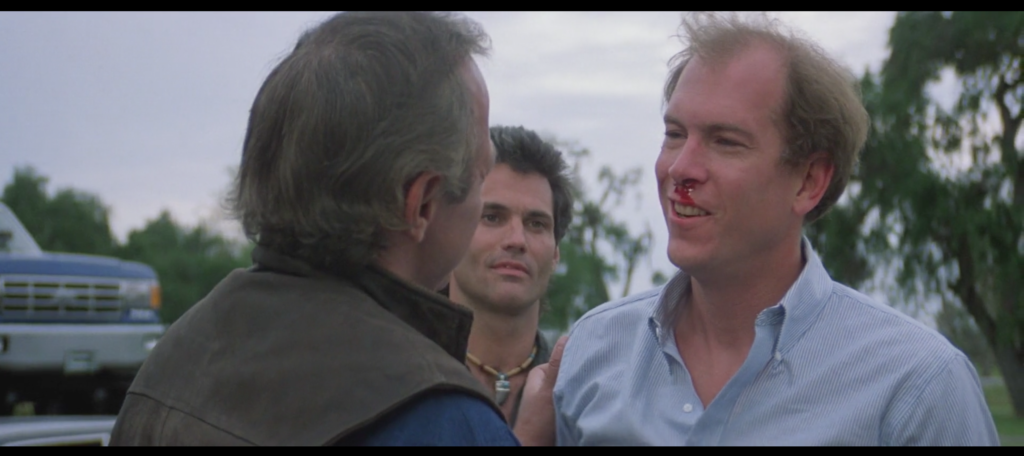Posts Tagged ‘karpis’
181. Memphis
June 30, 2019“Dalton,” Brad Wesley says. “I have a cousin in Memphis. Tells me you killed a man down there. Tells me you said it was self defense at the trial. But you and I know that isn’t so, don’t we.” Even in a scene as cockamamie as the Breakfast Conference, this series of statements makes an impact.
First and foremost it confirms what to this point had only been treated as part of Dalton’s cooler legendarium—a potential tall tale about ripping a man’s throat out with his bare hands that Hank relates to Horny Steve, and that Horny Steve rejects as bullshit out of hand. Wesley doesn’t mention the unusual method of dispatch at all, as the details do not concern him. What does concern him is that, in his own estimation anyway, he is up against a) a killer, and b) a liar. The former tells him Dalton can be useful; the latter tells him Dalton may be willing to be used.
Second, it shows us that despite all his sangfroid, Dalton does indeed have nerves that can be hit and buttons that can be pushed. He neither confirms nor denies Wesley’s cousin’s report, and a closeup reveals his reaction as muted. It’s only when Wesley claims that the self-defense justification was bullshit that Dalton gets up from his chair, preparing to storm off. Wesley preceded this story by arguing that of course Dalton loves beating people up for cash, that this is both his nature and human nature in general. Telling Dalton this story about his own life, then intimating that they can both sense the truth lurking under the surface, is Wesley’s attempt at turning him into a co-conspirator on this point. Wesley sees a useful man, he concludes that this man may consent to being used, he attempts to paint him into a corner in which he’s being used already, in which his use is a fait accompli. It’s rather deftly done, and that it leaves us not fully sure to what part of Wesley’s version of events Dalton objects is deft as well.
Third, it’s a pleasure to listen to, bearing many of the hallmarks of Road House‘s finest line readings. Ben Gazzara’s voice is a rollercoaster of subtle modulation, a miniature Bleeder Speech. “Dalton” is delivered in his best we are reasonable men, you and I; come, let us reason together voice. “I have a cousin in Memphis” is flatly factual. “Tells me you killed a man down there” swoops upward in register, as if he’s relating an interesting factoid from a wikipedia page he’s reading as he and Denise sit next to each other on the couch after dinner looking at their phones. “Tells me you said it was self defense at the trial” has a conclusory feel to it: Ah, well, that settles that. Then the verbal killshot: “But you and I know that isn’t so, don’t we.” His voice shifts to a level lower than in conclusion, revealing the deeper truth. Despite the sentence construction, this is, in that go-to maneuver of Road House rhetoric, not a question but a statement. They know. They both know.
Fourth…Brad Wesley has a cousin in Memphis.
It’s not the first time Wesley has alluded to family even within this scene; there’s his asshole grandfather, his only sister, and of course his only sister’s son Pat McGurn. (Not to mention his bastard son Jimmy, and no I will not be providing documentation.) So there’s precedent here—just not, more broadly speaking, within the world of action-movie archvillains. I don’t recall any other cousin relationships factoring into the mental landscapes of the big bads of ’80s and ’90s murder-spectacle movies, so this is something of an anomaly.
But how much does this cousin factor into that landscape? Let us first assume the cousin actually exists and is not simply a convenience concocted by Wesley to preserve the integrity of his intelligence network. Do they speak regularly? Does Brad give him or her (pronouns are dropped here, perhaps strategically) the occasional call just to say hello, or vice versa?
If so, how did Dalton come up? Did Wesley happen to mention the name of the new bouncer in town? Was the plight of their mutual relation Pat McGurn the topic at hand?
Or was it brought up deliberately? Did Wesley know some of Dalton’s past haunts, perhaps via the barfolk network into which his goons Morgan and Pat had been plugged for years? Did the cousin hear that a local figure of ill repute had traveled to good ol’ Brad’s stomping grounds?
And who is the cousin? Is it simply some unnamed, offscreen figure, concocted by the writers as a device for relaying this crucial bit of backstory? Or is it someone we’ve met? Someone who figures briefly into the film before this conversation and then returns whence he came to hear Beale Street talk? Someone we witness in Wesley’s company—at his pool party, in his driveway during a postmortem confab about the failed mission to secure reemployment for Brad’s nephew and his own first cousin once removed Pat McGurn, at a subsequent intra-family mission to intimidate Brad’s ex-uncle-in-law Red Webster—who then relays this information offscreen, says goodbye, and then is never seen again?
160. How to Build a Better Goon
June 9, 2019Ketchum is a forgettable goon. That’s just facts. I know who he is because I’ve watched Road House a million times, and you know who he is because you’re reading this series of daily essays about Road House. But it took me a long, long time, and many, many viewings, to put Ketchum together, as it were: that he drives the monster truck any time it shows up; that he’s the guy who tries to kick Dalton in the head with the knife in his boot and gets his ass kicked instead; that he’s the man who kills Wade Garrett, as evidenced by his retrieval of the knife used to kill him and insertion of that knife into a custom sheath on his hip; that he’s the last goon to tangle with Dalton hand to hand; that his name is Ketchum.
Alone among the goons present for the climax of the film, no one even says his name in the movie, a privilege afforded to Pat McGurn, Morgan, O’Connor, Tinker, and Jimmy. I’ve made a fuss about this over the past few months, alleging that it’s one of the reasons he’s so forgettable. But I’ve been thinking about that assertion lately, because I don’t think it has to be that way.
Consider the orcs.
Remember these handsome fellas? Sure you do. That’s Lurtz, Grishnakh, and Gothmog, from Peter Jackson’s Lord of the Rings trilogy. No one says their names in the movies. No one says any orc’s name in the movies. For that matter, Lurtz is a made-up name for a brand-new character the filmmakers introduced, and Gothmog is simply their best guess as to what a Mordor commander from the books whose species isn’t even specified by Tolkien might be like.
But if you’ve watched those movies recently, or if you find them memorable at all, you probably recall them as the uruk-hai leader with the Ariana Grande hairstyle whose head gets chopped off by Aragorn after a big fight, the raspy-voiced weasel who tries to hunt and kill Merry and Pippin before Treebeard squishes him, and the leader of the orc assault on Minas Tirith with the big puffy pink face. You remember how they look, how they sound, and what they do, because Jackson and company made a big point of giving them memorable introductions, isolating them with distinct camerawork (closeups, angles, whatever the case), and having them do their most memorable stuff right there for all to see. Lurtz was created to give the uruk-hai chasing the Fellowship a distinctive leadership figure so the film’s climax would work as such. It’s a far cry from the aggressively nondescript Ketchum first showing up as a non-speaking background character wearing face-masking sunglasses during the Bleeder scene and eventually killing Road House‘s secondary protagonist off-screen.
For that matter, it’s a far cry from these fellows.
Karpis and Mountain are also never named. They’re only shown in close-up in couple of scenes apiece; in Mountain’s case, one of those scenes is a pool party (in which Karpis appears in the background). Neither of them make it to the film’s final reel but it’s not because they get killed—they simply stop showing up, because that’s how Road House rolls.
But you remember them, right? They each have a distinctive look, with Karpis’s clothes from the Bun E. Carlos collection and Mountain’s sheer size. They each do something interesting: Karpis stares down Dalton, and Mountain dances like an idiot and later Sam Elliott tells him “I sure ain’t gonna show you my dick” before taking him down. The camera makes a point of both of them: Karpis stares right into it in closeup, while Mountain becomes the focal point as it follows Wesley and Denise into the pool party.
When it comes to differentiating your goons, bothering to say their name during the film helps, especially if you name half a dozen comparable characters during the film and run the risk of drowning the unnamed one out. (That doesn’t apply to LotR.) But you need the look, you need a distinctive action, and you need a memorable trick with the camera to make the look and the action click in the viewer’s mind. It’s a bit unfair to compare Rowdy Herrington’s work with Ketchum to Peter Jackson’s work in The Lord of the Rings, which is better at this than any other film I’ve ever seen. My point is simply, what’s in a name?
156. “Now you will see me one more time if you do good. You will see me two more times if you do bad. Goodnight.”
June 5, 2019121. Life’s Been Good
May 1, 2019I have a mansion I visit sometimes
Brad Wesley lives there, he makes me do crimes
I live in Jasper, near the new mall
We made some old guys pay for it all
They say I’m crazy but I have a nice smile
They put most of my part in the cylindrical file
Life’s been good to me so far
Brad Wesley’s Mustang does one-eighty-five
I’ll stare at Dalton, Jimmy can drive
My necktie’s loose so I never choke
I dress like Albert Hammond the Stroke
I crashed Red Webster’s and trashed the whole place
I watched O’Connor get punched in the face
Though I’m listed as Karpis in credits as they crawl
I’m barely in this movie at all
Lucky I’m sane when my three scenes are through
(In the background at Brad’s pool)
(Brad’s pool)
Don’t say my name, but for Tinker they do
Life’s been good to me so far
I’m just a soldier in Brad Wesley’s war
After this scene you won’t see me no more
Red Webster cleans up my mess with a mop
In A Nightmare on Elm Street, I play a cop
I am in Road House but for not that much time
(Everybody say Karpis)
(Karpis)
Vanish completely after 0:45
Life’s been good to me so far
120. Life Is Good, or The Apotheosis of Karpis
April 30, 2019For the past week I’ve chronicled sixty seconds in the lives of Mr. Wade Garret and Dr. James Dalton. (For the purposes of this conversation I’m assuming his degree in philosophy from NYU was a Ph.D.) During this pivotal minute, Dalton calls his old friend and mentor Wade to ask if he’s heard anything about a guy by the name of Brad Wesley. At this point, friends, you and I have talked about Dalton’s initial encounters with the richest man in Jasper: watching him buzz Emmett’s horse corral with his helicopter, swerving out of the way as he sings doo-wop while driving into oncoming traffic, shaking hands and having a brief conversation at Red Webster’s auto parts store, beating the shit out of several of his minions after they try to stab him to death in an attempt to make the Double Deuce re-hire a bartender. I’d say he’s handled all this rather well. What, you might be wondering, occasioned his call for counsel?
These happy assholes.
Dalton catches two of Brad Wesley’s premier goons, Jimmy and Karpis, just as they pull out of Red’s parking lot. Karpis, whom we see exiting the store, has just busted the place up, spilling various motor oils and antifreezes and whatnot all over the place as punishment for Red’s recalcitrance in paying his full “contribution” to the Jasper Improvement Society, the legal name of Wesley’s protection racket.
“Work ain’t work when you’re havin’ fun,” Jimmy says from behind the wheel of the getaway car as Karpis hops in after doing the deed.
“Life is good,” Karpis confirms.
And like that—poof—he’s gone.
One last, lingering, smoldering staredown at Dalton later, Karpis is driven away from the store and right out of the movie, forever. It’s the last we see of him, much to my chagrin, handsome devil that he is.
But oh, his legacy! What Karpis does this day puts Dalton and Wade on a collision course with Jimmy and Wesley, their opposite numbers. The explosion that results, which includes multiple literal explosions, will leave three of those four men dead, and change the face of Jasper forever. And Karpis’s mesmerizing face that sets it all in motion. In that Cheshire Cat grin, I see the future: Life is good, but all men must die.
114. The Nine
April 24, 2019Nine quarters, says the sign that appears in the middle of Dalton’s pivotal conversation with Wade Garrett, right after he blows off the threat presented by Brad Wesley. Right away we can see that reality has warped a little, that a glitch in the matrix has appeared. As well it might: Dalton has just underestimated his opponent and failed to expect the unexpected, a violation of his own First Rule. And for that, a price must be paid.
But what if there’s more to it than that?
It was not I who set myself on this path, but reader @RoddySwears. It was he who noted the numerological significance of the established price. Nine quarters. Two dollars and twenty-five cents. $2.25. 2 + 2 = 9.
What could such a specific prophecy mean?
Then I realized.
The Nine are abroad.
013. Men look at Dalton
January 13, 2019When men look at women in Road House it means trouble. Steve the bouncer ogles his teenage would-be conquests. A husband with a cuckold fetish and a goofball barfly fetishize and fondle his wife’s breasts. A belligerent drunk starts a knife fight when people try to prevent him from watching his girlfriend dance on a table. Brad Wesley throws an absurd string-bikini pool party for his army of goons. A horned-up soldier rushes the stage in the topless bar where Wade Garrett works. Denise strips in front of the Double Deuce’s wolf-whistling bad seeds under Wesley’s approving eye in a strange act of macho-sexual judo. With two exceptions—the superimposition of the film’s title over an anonymous woman’s rear end, echoed by Wade hating to see Doc leave but loving to watch her walk away—the traditional male gaze is an indication that something is wrong.
When men look at Dalton, it’s different. And men look at Dalton alright. All kinds of men, for all kinds of reasons.
When they first meet, goons like Karpis and Jimmy lock eyes with Dalton in staredowns that sizzle with psychosexual challenge. (In Jimmy’s case the sexual element is made abundantly, infamously clear later on in the film.)
Frank Tilghman stares at Dalton and smiles over and over again, like a man seeing his favorite meal on the way over to his table. “I want you,” he says during one such glance, followed in that same conversation with a knowing “I thought you’d be bigger.” “He’s good. He’s real good,” he says to another man during another. Honestly Tilghman is such a strange character that he probably deserves an essay series of his own, but his open near-worship of Dalton is a start.
Both Dalton’s friendly landlord Emmet and his evil neighbor Wesley watch Dalton perform tai chi, shirtless and slick with sweat. Wesley has the look you often see on the faces of men in movies who’ve caught a glimpse of a topless woman through a window. Emmet looks like he’s questioning a whole lot about the world and his place in it.
Wesley even watches Dalton and Elizabeth have sex. You might think that Elizabeth is the object of the gaze here, but at no other point in the film does Wesley bring her up as a point of contention between himself and Dalton, even though their relationship does seem to catalyze a new level of hostility between the two men. There’s no “she’s mine, if I can’t have her no one will,” and when he talks to her about Dalton it’s to express regret that she’s wound up with a lowlife drifter, not to threaten her to come back to him. He only has eyes for Dalton.
And honestly, who wouldn’t? Look at him.
By constantly showing us men who visually appreciate Dalton, Road House models behavior for its primarily male audience. Which is not to say women were not a target as well. Surely a decision was made to capitalize on the sex symbol status of the man who plays Dalton, Patrick Swayze, for the women in the audience—by then he’d starred in the smash hit Dirty Dancing, and another romantic blockbuster, Ghost, was on the horizon; his sex scene with Kelly Lynch set to Otis Redding beat the pottery scene with Demi Moore set to “Unchained Melody” to the punch.
But Road House‘s life since its theatrical release has been one of basic-cable afternoon screenings for dudes. I myself never caught it that way, but I first saw it during a Road House/The Warriors/The Road Warrior triple feature with a bunch of drunk and high friends, which is more or less the same idiom. I came away from my first viewing feeling just an unbelievable amount of affection and admiration for Patrick Swayze, an actor I’d never really thought about at all before. When he was diagnosed with pancreatic cancer, I held a Road House/Steel Dawn/Point Break triple feature at my place and charged everyone a twenty-dollar donation to pancreatic cancer research for admission. I love Patrick Swayze just as I love Dalton. I believe these shots of men looking at Dalton, capturing the blend of admiration, envy, desire, and awe they feel when they look at him—call it the male swayz—are, at least in part, the reason why.
007. Goons
January 7, 2019You can’t make a JC Penney without breaking some eggs. That’s where these fellows come in. Organized crime boss, mall developer, and job creator Brad Wesley employs a small army of goons, thugs, henchmen, minions, and muscle to do his dirty work around the town of Jasper, Missouri. Blowing up an auto parts store, blowing up an old man’s shack, and running over a car dealership with a monster truck are just the most glamorous aspects of the gig: These guys’ main function is to punch people in the face, and get punched in the face in turn. The following is a brief survey of the Wesleyans with speaking parts. You’ll be seeing more of these gentlemen for sure, but this should bring you up to speed.
Morgan
Ornery brute. Originally a bouncer at the Double Deuce. Fired by Dalton because he doesn’t have “the right temperament for the trade.” Doesn’t take it well. Played by pro wrestling legend Terry Funk. Strengths: Looks and acts like a guy who could kick someone’s ass. (Not for nothing did he prompt the “It’s still real to me, dammit!” incident.) Weaknesses: Syllable emphasis.
Pat McGurn
Vicious weasel. Nephew of Brad Wesley. Originally a bartender at the Double Deuce. Fired by Dalton for skimming from the till, sparking the Wesley/Dalton feud. Played by punk legend John Doe. Strengths: Convincingly sleazy mustache. Weaknesses: Uncle’s Boy.
Jimmy
The main man. Wesley’s favorite. Rarely far from his boss’s side. Martial-arts master who fights both Dalton and Wade Garrett to near-standstills. Gets the film’s most famous non-Swayze line: “I used to fuck guys like you in prison!” Played by Marshall Teague. Strengths: Smoldering eyes, witty banter, maniacal laugh, actual fighting skill. Weaknesses: Sore throat.
O’Connor
Middle management. Basso profundo beanpole who leads the expedition to restore Pat to full employment at the Double Deuce, among other crucial tasks requiring minimal competence. Played by Juilliard graduate Michael Rider. Strengths: Business casual wardrobe. Weaknesses: He’s a bleeder.
Tinker
Lummox. Portly core component of the Wesley team. Frequent partner of O’Connor. Partial to trucker hats and suspenders. Played by John Young. Strengths: Comes closer to actually killing Dalton than almost anyone else, inflicting the knife wound that leads to Dalton meeting Dr. Elizabeth Clay; perhaps for this reason he is the only member of the Wesley Organization to find forgiveness and redemption. Weaknesses: Polar bears.
Mountain
The tallest. Towering doofus who serves primarily to dance amusingly during Wesley’s pool party and engage in brief but memorable dick-based repartee with Sam Elliott. Played by Check It Out! with Dr. Steve Brule fry cook Tiny Ron. Strengths: Hell of a dancer, very tall. Weaknesses: “Give me the biggest guy in the world: You smash his knee, he’ll drop like a stone.”
Ketchum
Serious business. Wesley’s most all-American thug. Trusted with the most hardcore tasks. Almost entirely forgettable despite performing several of the film’s greatest acts of villainy unless you’ve seen the movie enough to write about it every day for a year. Played by stuntman Anthony De Longis. Strengths: boot-mounted knife, regular knife, monster truck. Weaknesses: …wait, who are we talking about again?
Karpis
Man of mystery. Piercingly handsome guy in a smart-looking suit worn with rakish dishevelment. Present in background when Wesley’s chopper lands during the character’s introudction. Present in background when Wesley throws a pool party. Wordlessly witnesses Wesley’s punishment of O’Connor for failing to secure Pat’s job. Tosses Red Webster’s store to keep him in line and says “Life is good” as his one line. Vanishes completely from the film after these four scenes. Lives forever in my heart. Played by Joe Unger, aka Sgt. Garcia from A Nightmare on Elm Street. Strengths: Looks like he plays rhythm guitar for Dr. Feelgood or the Strokes circa the $2 Bill show, dangerously sexy. Weaknesses: Barely in the movie, named “Karpis.”

